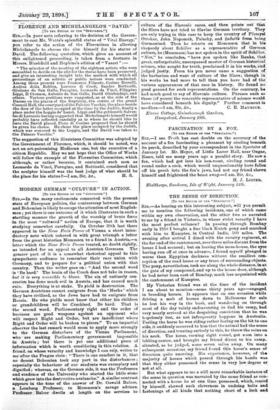MODERN GERMAN " CULTURE " IN ACTION.
[To THE EDITOR OF THE 'SPECTATOR."] SIE,—In the many excitements connected with the present state of European politics, the controversy between German and Bohemian is likely to escape the attention of most English- men ; yet there is one outcome of it which illustrates in such a startling manner the growth of the worship of brute force in the most " cultared" nation of Europe, that it is worth studying somewhat carefully. On October 30th last there appeared in the Neue Freie Presse of Vienna a short intro- ductory note which ushered in with great triumph a letter from the great historian Mommsen to a friend in Austria,—a letter which the Nene Freie Presse treated, no doubt rightly, as intended for an appeal to all Austrian Germans. The greater part of it is a somewhat rhetorical appeal to this sympathetic audience to remember their race union with Germany, and to prepare for a political union with that country. Then the writer goes on : "And the second word is Be hard.' The brain of the Czech does not take in reason, .but it is very accessible to blows. The sin of untimely con- cession has done much evil in Austria, and has caused much ruin. Everything is at stake. To yield is destruction. The German Austrians cannot emigrate from the 'Marks' which they have civilised, as the Jews have had to emigrate from Russia. He who yields must know that either his children .or grandchildren will be Czechised. Be hard. That is the second word. Parliamentary right and the order of business are good weapons against an opponent who will respect Right and Order, but are insufficient where Right and Order will be broken to pieces." To an impartial 'observer the last remark would seem to apply more strongly to the German disturbers of the Vienna Parliament, who are making Parliamentary government impossible in Austria ; but there is yet one additional piece of information which is worth considering in this relation. A friend, on whose veracity and knowledge I can rely, writes to me after the Prague riots : "There is one comfort in it, that no decent Bohemian took any part in the disturbances ; especially the behaviour of our students was exemplary and dignified ; whereas, on the German side, it was the Professors and students of the University who started the little stone which grew into the dest---.7.ctive avalanche." A similar contrast appears in the tone of the answer of Dr. Oswald Balzer, a Lemberg Professor, to Mommsen's savage advices. Professor Balzer dwells at length on the services to culture of the Slavonic races, and then points out that the Slays have not tried to Slavise German territory. They are only trying in this case to keep the country of Pi.emysl Ottokar, John Nepomnk, Palacky, and gafaiik from being Germanised. Then he retorts on Mommsen that in his rhapsody about Schiller as a representative of German culture, he (Mommsen) has not spoken in the spirit of Schiller. "Nor," he concludes, "have you spoken like Ranke, that great, unforgettable, unsurpassed master of German historical science, who sought for truth, proclaimed it in his works, and judged justly. From his pen never came a suggestion of the barbarism and want of culture of the Slays; though in his works he had more to tell than you have had of the various appearances of that race in history. He found no good ground for such representations. On the contrary, ha had much good to say of Slavonic culture. Phrases such as those (of yours) the venerable representative of science would have considered beneath his dignity." Further comment is


















































 Previous page
Previous page